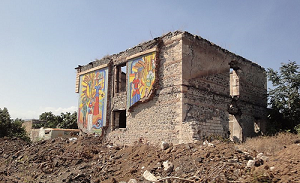A Year After The “Four-Day War”, Guns Continue to Speak Louder than Diplomats in Nagorno-Karabakh
By Azad Garibov
April 21, 2017, the CACI Analyst
One year has passed since the “Four-Day War” – an unprecedented escalation of the Nagorno-Karabakh conflict on April 1-5, 2016 that claimed the lives of over a hundred soldiers on both sides. The conflict over Nagorno-Karabakh has never been truly frozen, yet the increased intensity of clashes since April 2016 demonstrates that violence can flare up at any time, destabilizing the already fragile region. As no peaceful solution is visible on the horizon, the Line of Contact (LoC) between Azerbaijan’s and Armenia’s armed forces has become the most militarized area of the former Soviet Union. Azerbaijani and Armenian societies have also grown increasingly nationalistic as fighting intensifies and casualty rates grow on the frontline.

Russia's warfare strategy and borderization in Georgia
By George Tsereteli (05/08/2015 issue of the CACI Analyst)
On July 10, Russian military personnel moved border markers further into Georgian territory from the breakaway region of South Ossetia, in the process positioning the new “border” even closer to the strategically vital East-West highway and placing more of the Baku-Supsa pipeline under Russian control. As a result, the Georgian government has been criticized by opposition groups for not doing enough to prevent such incursions, and for not responding adequately. As prescribed by contemporary Russian military doctrine, Russia’s recent actions in Georgia, as well as in other parts of the world, are manifestations of a new warfare strategy.





